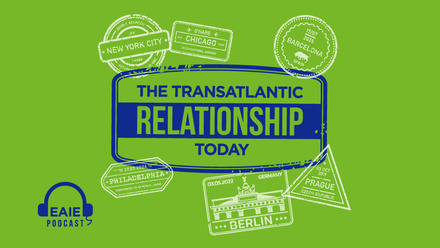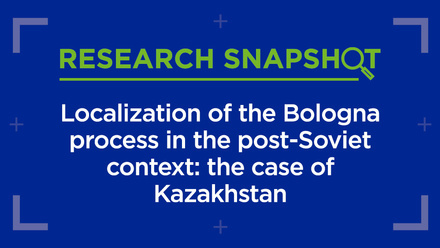4 tips for nurturing partnerships in a crisis

India’s first Prime Minister, Jawaharlal Nehru, once said "every little thing counts in a crisis’’. This statement certainly holds true for global partnerships during a pandemic. As we mark the one-year anniversary of COVID-19 making its presence felt around the world, now is an opportune time to reflect on how partnerships have fared during this devastating and unforeseen global crisis.
This blog provides an example of how one university stepped up to handle two distinct scenarios. As a receiving institution, University College Dublin (UCD) worked closely with sending partner universities to support their own response to the pandemic. As we look back on the last year, we’re now framing insights into which aspects of our partnership engagement will be most important as we move forward into the looming ‘new normal’.
Partnerships in hiatus
Unsurprisingly, the majority of sending partners chose to repatriate their students immediately when the pandemic hit and to suspend study abroad programmes until sometime in the future when ‘normalcy’ would hopefully return. High-level decisions were made at these universities to keep students at home and to monitor the situation over time.
As in all good relationships, it is important to smooth over small annoyances and work together to see the big picture
As a receiving institution, UCD wholeheartedly accepted and supported the decisions made by this group of partners and began to engage with them in other ways. Some partners experienced unsettling structural changes in their international offices and many jobs have been lost in this area.
During these times of uncertainty, it has been crucial to stay connected as partners while in hiatus from doing what the partnership was primarily set up to do. Regular communication has been key to keep partners informed about the COVID-19 situation in Ireland, while providing snapshots of the programmes that have continued to run safely on the campus. UCD has completed COVID-19 surveys promptly to supply the detailed information that partners need to evaluate the situation on the ground until a comfort level is reached to send students again.
Partnerships leaning in
A small group of sending partners chose to lean in and to continue to send their students to UCD in the midst of the pandemic. Their decisions were predicated on a full audit and approval of UCD’s COVID-19 campus safety protocols, and the longstanding, trusting working relationships that existed prior to the pandemic were a key factor in this decision-making, giving partners the confidence to move forward. By way of example, UCD worked closely with its longstanding partner Northeastern University in Boston to host a group of freshman students in September 2020.
With a ‘can-do’ spirit, UCD and its partner universities collectively asked the question, how can we safely leverage the learning and growing opportunities that students can uncover in this challenging but unique moment in history? With a commitment to putting student safety first on both sides, the next priorities were to ensure academic continuity and a positive student experience, despite the uncertainties that lay ahead.
One measure of success on this front related to student retention, with only two out of 104 students who travelled to Ireland withdrawing from the study abroad programme. Although the students missed human interaction because of limitations imposed by the virus, this resilient group came to embrace other opportunities for developing close bonds with others. To quote one student, “Independence and adaptability absolutely go hand-in-hand, but I feel more comfortable with feeling my way through unfamiliar situations now than before.”
What were the key aspects that ensured the success of ‘lean-in partnerships’ during the crisis?
1) Communication and responsiveness
Partner interactions that normally took place face-to-face, through campus visits and meetings at international conferences, had to pivot to being exclusively virtual this year. The shifting sands brought about by the pandemic meant that sometimes emails and weekly Zoom calls did not offer a sufficient level of access to partners. Late night and early morning phone calls were often required to discuss the issues that arose and decisions that needed to be made. We discovered that clear and prompt communication was very important, especially when bad news needed to be delivered or plans had to be changed.
2) Adaptability and patience
Although core expectations were articulated in partnership agreements, the practicalities of programming had to adapt to the current reality and government restrictions. It was important for both partners not to over-promise to students on what they could expect. We needed to be nimble, quick-thinking and creative with our partners to continue to provide students with a positive experience which, although different to the usual experience, was still valuable and relevant.
Patience was required on both sides when navigating different cultural and institutional responses to health and safety protocols. Partners’ expectations can vary depending on their viewpoint. Sending partners might tend towards micro-managing or trying to impose home country approaches to the local situation. For example, some partners had weekly COVID testing on their home campus and were unsettled that UCD didn’t have the same facilities. As in all good relationships, it was important to smooth over small annoyances and to work together to see the big picture.
3) Clarity around who does what
A clear framework around the roles of each partner was essential. For example, dealing with parents’ queries and concerns was in the remit of the partner. If the parent subsequently contacted UCD, it was important to back up the partner’s position on an issue to ensure consistency of messaging.
4) The little things are actually big things
The little things count in a crisis.
These matters are about going the extra mile. In one instance, a group of five students could not travel home at the last minute before Christmas because it was discovered that they were close contacts of a student who had tested positive for COVID-19. UCD pulled out the stops to make their extended stay as comfortable as possible and arranged the delivery of Christmas dinner to the group. This small gesture helped our partners to reassure the students’ parents that they were being well looked-after at UCD, despite the fact that it had not been possible for them to return home as planned.
Dynamic new directions
With care and attention, partnerships can fare well and flourish in times of crisis. Institutions should thoughtfully reflect on the stewardship of partnerships and ensure that they have the right resources in place for this aspect of their work, not just for the programmatic activities themselves.
When partners pause programmes, we should continue to keep connections strong and meaningful, despite not working together in the ways that we are accustomed to. When partners ‘lean in’, we discover that the crisis serves to amplify a commonality of purpose on both sides; and working towards a mutual goal to support students has deepened levels of trust and sparked a new dynamism into these partnerships.






